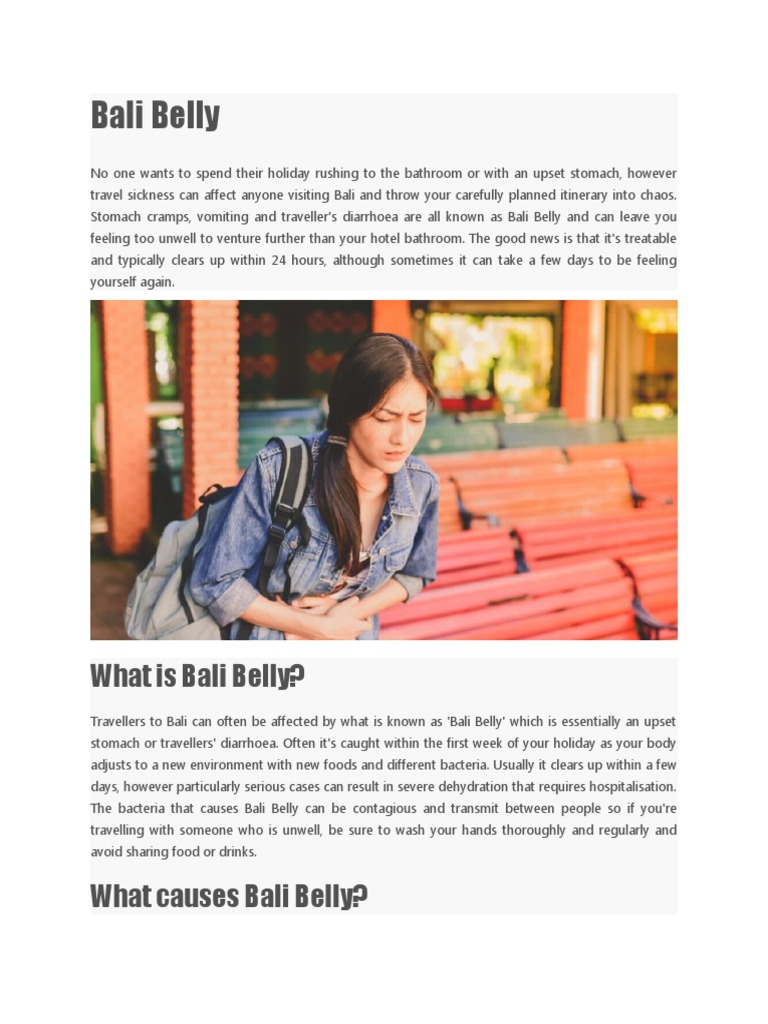What Is Bali Belly? Causes, Symptoms And How To Treat It

Table of Contents
What is Bali Belly? A Definition and Understanding
"Bali Belly" is a colloquial term for traveler's diarrhea, a common stomach illness experienced by individuals traveling to Bali and other tropical destinations. While it's informally associated with Bali, it's not unique to the island and can occur in various regions with similar climates and hygiene standards. It's crucial to distinguish Bali Belly from other stomach ailments, such as appendicitis or food poisoning that may require different treatment approaches. The prevalence of this condition in Southeast Asia and other developing countries is significantly higher than in developed nations due to differences in sanitation and food safety practices.
Causes of Bali Belly: Identifying the Culprits
Bali Belly is primarily caused by consuming contaminated food or water. Let's explore the key culprits:
Contaminated Food and Water
- Raw seafood: Undercooked or raw seafood is a significant source of bacterial and parasitic infections.
- Undercooked meat: Improperly cooked meat can harbor harmful bacteria like Salmonella and E. coli.
- Unwashed fruits and vegetables: Produce contaminated with fecal matter can transmit various pathogens.
- Ice made with unclean water: Ice used in drinks is often made with tap water, which might contain harmful microorganisms.
Maintaining meticulous food hygiene and prioritizing safe water sources is paramount in preventing Bali Belly. Stick to bottled water, avoid ice in your drinks unless you know it's made with purified water, and choose thoroughly cooked food from reputable establishments.
Bacterial and Viral Infections
Several bacteria and viruses are responsible for causing traveler's diarrhea. These include:
- ** E. coli:** A common bacterium found in contaminated food and water.
- ** Salmonella:** Another bacterium that often causes food poisoning.
- Norovirus: A highly contagious virus that can spread rapidly in crowded areas.
- Rotavirus: A virus primarily affecting children, but adults can also become infected.
These pathogens cause inflammation in the intestines, leading to the characteristic symptoms of Bali Belly.
Parasites
Parasitic infections can also contribute to traveler's diarrhea. The most common culprits are:
- ** Giardia lamblia:** A microscopic parasite causing giardiasis.
- ** Cryptosporidium parvum:** Another parasite causing cryptosporidiosis.
These parasites are transmitted through contaminated food or water and can cause prolonged diarrhea and other gastrointestinal problems.
Recognizing the Symptoms of Bali Belly: What to Watch For
Recognizing the symptoms of Bali Belly is crucial for prompt treatment.
Gastrointestinal Symptoms
The most common symptoms include:
- Diarrhea: Frequent, loose, watery stools.
- Stomach cramps: Painful spasms in the abdominal area.
- Nausea: Feeling sick to your stomach.
- Vomiting: Expelling stomach contents.
- Bloating: Feeling of fullness and distension in the abdomen.
The frequency and severity of these symptoms can vary greatly from person to person.
Other Potential Symptoms
While less common, other symptoms can include:
- Fever: Elevated body temperature.
- Chills: Feeling cold and shivering.
- Headache: Pain in the head.
- Muscle aches: Pain and soreness in the muscles.
- Dehydration: Severe dehydration is a serious complication and requires immediate medical attention. Symptoms include excessive thirst, dry mouth, dizziness, and decreased urine output.
Effective Treatments for Bali Belly: Relief and Recovery
Treating Bali Belly involves a combination of self-care and, in some cases, medical intervention.
Self-Care Strategies
- Rehydration: This is crucial. Drink plenty of clear fluids, such as oral rehydration solutions (ORS), clear broths, or electrolyte drinks. Avoid sugary drinks.
- Dietary changes: The BRAT diet (bananas, rice, applesauce, toast) is often recommended. These foods are easy to digest and can help to soothe the irritated digestive system.
- Rest: Get plenty of rest to allow your body to recover. Avoid strenuous activity.
Over-the-Counter Medications
Over-the-counter medications, such as loperamide (an anti-diarrheal medication), can help to reduce the frequency of bowel movements. However, these should be used with caution and only after consulting a doctor, especially if you have a fever or bloody diarrhea. Anti-nausea medications can also provide relief from nausea and vomiting.
When to Seek Medical Attention
Seek immediate medical attention if you experience:
- Severe dehydration: Signs include dizziness, confusion, and decreased urine output.
- Bloody diarrhea: This may indicate a more serious infection.
- High fever: A fever above 102°F (39°C) warrants medical evaluation.
- Persistent vomiting: Inability to keep down fluids can lead to dehydration.
A doctor can provide a proper diagnosis and prescribe appropriate medication if necessary.
Conclusion
Bali Belly, or traveler's diarrhea, is a common stomach illness affecting travelers to tropical regions. It's primarily caused by contaminated food and water, bacterial or viral infections, or parasitic infections. Symptoms can range from mild to severe, including diarrhea, stomach cramps, nausea, and vomiting. Treatment often involves self-care strategies such as rehydration and dietary modifications. However, medical attention is necessary for severe symptoms. Preventing Bali Belly involves practicing good food and water safety, choosing reputable restaurants, washing hands frequently, and drinking bottled water. Don't let Bali Belly spoil your Bali adventure! Learn more about this common traveler's ailment and take steps to protect your health before, during, and after your trip. Research and plan accordingly to ensure a healthy and enjoyable experience. Remember to prioritize safe food and water practices to minimize your risk of experiencing this common traveler's stomach illness.

Featured Posts
-
 Pacers Injury Report Mathurin Downgraded For Kings Game
May 28, 2025
Pacers Injury Report Mathurin Downgraded For Kings Game
May 28, 2025 -
 Nba 2 K25 Playoffs Updated Player Ratings Reflect Real World Performances
May 28, 2025
Nba 2 K25 Playoffs Updated Player Ratings Reflect Real World Performances
May 28, 2025 -
 January 6th And Defamation Ray Epps Lawsuit Against Fox News Explained
May 28, 2025
January 6th And Defamation Ray Epps Lawsuit Against Fox News Explained
May 28, 2025 -
 Analyzing The Rumors Hugh Jackman In Avengers Doomsday
May 28, 2025
Analyzing The Rumors Hugh Jackman In Avengers Doomsday
May 28, 2025 -
 The Writers And Actors Strike What It Means For Hollywood
May 28, 2025
The Writers And Actors Strike What It Means For Hollywood
May 28, 2025
